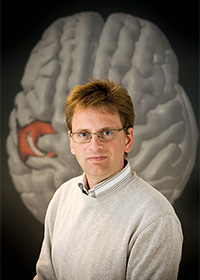Prof. Dr. Andreas Roepstorff

Prof. Dr. Andreas Roepstorff
Prof. Roepstorff is a professor of cognition, communication and culture in the departments of Culture and Society and Clinical Medicine, Aarhus University. He works at the interface between anthropology, cognitive science and neuroscience, and is equally interested in the workings of the mind and brain, and in how cognitive science and brain imaging, as fields of knowledge production, relate to other scientific and public fields. He has formal training in social anthropology and in neurobiology and has published widely both within these disciplines as well as in various collaborations across other fields, such as psychology, linguistics, clinical medicine, semiotics, and philosophy. He is the director of the Interacting Minds Centre at Aarhus University and is involved in a number of transdisciplinary collaborations, focusing on aspects of human interaction. He has a long-standing research interest in cognitive aspects of contemplative practices.
Relevant (selected) publications
1.) Roepstorff, A., Niewöhner, J., & Beck, S. (2010). Enculturing brains through patterned practices. Neural Networks, 23(8–9), 1051–1059.
2.) Roepstorff, A., & Vogeley, K. (2009). Contextualising culture and social cognition. Trends in Cognitive Sciences, 13(12), 511–516.
3.) Roepstorff, A., Hohwy, J., & Friston, K. (2008). Predictive coding explains binocular rivalry: An epistemological review. Cognition, 108(3), 687–701.
4.) Roepstorff, A., Vuust, P., Pallesen, K. J., Bailey, C., Van Zuijen, T. L., Gjedde, A., & Østergaard, L. (2005). To musicians, the message is in the meter: pre-attentive neuronal responses to incongruent rhythm are left-lateralized in musicians. Neuroimage, 24(2), 560–564.
5.) Roepstorff, A., Gallagher, H. L., Jack, A. I., & Frith, C. D. (2002). Imaging the intentional stance in a competitive game. Neuroimage, 16(3), 814–821.
Relevant (selected) projects and activities
1.) Director of the Interacting Minds Centre at Aarhus University
2.) Leader of the project “Experiencing, Experimenting, Reflecting” & PLAYTrack project
3.) Research project: A Calculus of Culture (01/01/2017 → 31/12/2017). The Culture Analytics Network (CAN) links renowned applied mathematicians from China and US with Danish humanities researchers who share an interest in culture analytics. The purpose of CAN is to propose a calculus of culture that circumvents the black box by identifying fundamental processes of culture through applications of concepts and state-of-the-art models from complexity science to big cultural data.
4.) Research project: IMC: Interacting Minds Centre - Experimental Research on Cognition, Communication and Choice (01/01/2012 → 31/12/2016). The Interacting Minds Centre (IMC) provides a transdisciplinary platform to study human interaction. It involves researchers from the humanities, social sciences, cognitive sciences, brain imaging, biology and clinical research. It studies the interplay between three related topics: cognition, communication, and choice.
5.) Research project: Techne: Technologies of the Mind (01/01/2011 → 29/10/2015). This project, funded by the VELUX foundation, attempted to understand technology as a way of using the brain and body, incorporated into practices that people develop naturally to reach different objectives. The project included resources from the fields of anthropology, archaeology, linguistics and cognitive sciences to investigate e.g. rituals, reading and writing, masquerades and physical objects.
